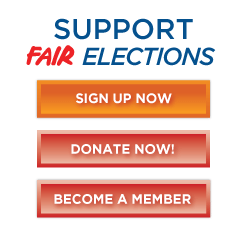SACRAMENTO, CA -- A new bill to require that initiative
petitions circulated by paid signature gatherers must
clearly disclose their top 3 funders was launched with the
introduction of SB 651 by Senator Ben Allen. SB 651 is
sponsored by the California Clean Money Campaign.
"Every election season, voters are bombarded with
requests to sign initiative petitions by paid signature
gatherers who aren't required to disclose or even know
who's paying for the initiatives they've been hired to
qualify," said Senator Ben Allen (D-Santa Monica),
author of SB 651. "SB 651 will make sure voters know
who's behind the initiatives they're being asked to help
put on the ballot."
A dizzying 115 initiatives qualified for circulation for
the 2016 election, with a near-record 17 measures actually
appearing on the November 2016 ballot. Except for
Proposition 59, which was put on the ballot by the
legislature after passage of a citizens-led legislative
campaign for SB 254 (Allen), all the propositions qualified
only after their sponsors spent a million dollars or more
paying for signature gathering, with voters rarely knowing
who they were.
SB 651 as now planned would change that by requiring
initiative petitions circulated by paid signature gatherers
to clearly display the names of their top 3 funders in a
disclosure box similar to that proposed for print mailers
in AB 14, the California DISCLOSE Act
(Gomez-Levine). Signature gathering firms would be required
to ensure that their paid circulators use updated petitions
within two weeks if a new contributor becomes a top 3
funder.
As introduced, SB 651 mirrors the language of AB 400, a
2014 bill by then Assemblymember Paul Fong that passed the
legislature before being vetoed by Governor Brown due to
concerns about the practicality of reprinting initiative
petitions in the time allotted to collect signatures.
Planned amendments to SB 651 will address those concerns
through changes such as dropping the number of required
contributors from 5 to 3, by saying that changes only in
ordering don't require reprinting, and by only applying to
initiatives circulated by committees having contributors of
$50,000 or more.
"California's initiative process was created over 100
years ago to allow voters to bypass the special interests
who had a stranglehold on Sacramento," said Trent
Lange, President of the California Clean Money Campaign,
sponsor of SB 651. "Unfortunately, special interests now
often abuse the very process that was meant to limit their
power by spending millions to qualify deceptive
initiatives. Voters deserve to know who they are before
being asked to sign."
Californians from all major political parties have
overwhelmingly stated their support for greater disclosure
of who funds initiatives. A poll by the Public Policy
Institute of California in October 2013 found 84 percent of
likely California voters favored legislation to increase
public disclosure of funding sources in initiative
campaigns. Those in favor include 80 percent of
Republicans, 81 percent of Democrats and 85 percent of
Independents.
#####
The California Clean Money Campaign is a non-partisan
501(c)(3) organization that has been dedicated to educating
the public about the need to lessen the unfair influence of
Big Money on election campaigns since 2001. For further
information, visit www.CAclean.org.



